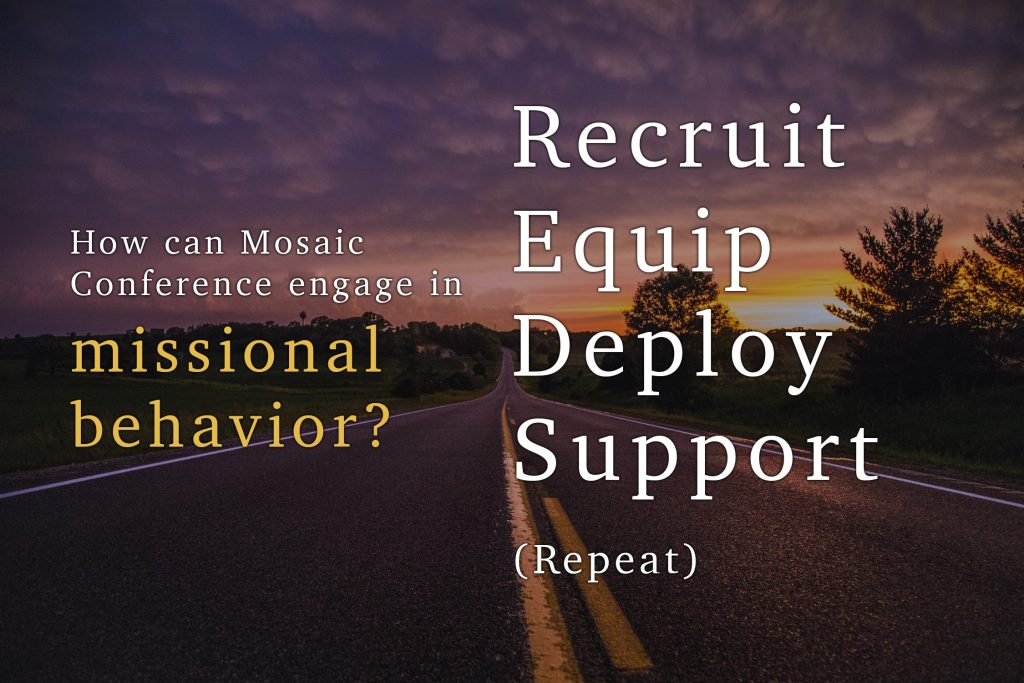Years and years ago, when I was in seminary, my mission professor said, “If everything is mission, then nothing is mission.” Mission, according to the late South African missiologist, David Bosch, is “crossing frontiers in the form of a servant.” As Leadership Minister in California, I am often asked, how can the Conference be more missional?
My answer, to be honest, may be difficult to accept. Mosaic Conference is not particularly missional. The congregations of the Mosaic Conference are not overly missional. It falls to disciples – followers of Jesus Christ – to be fully missional.
Disciples are not just folks who have aced the church membership class. Disciples are people who have found a grateful heart because of the God who has redeemed them in Christ and who live with both a stubborn loyalty to Christian community and an unfettered love for their neighbors. They worship God with exuberance and lead with big hearts and sometimes big mouths. They challenge one another to do justice in the world through the power of the Holy Spirit.
So how can Mosaic Conference engage in missional behavior?
First, recruit. The primary missional environment of any church group is to be a talent scout for leaders, now and for the future. Engage with people in our churches to see if they have a craving for the Reign of God. As a Leadership Minister, I am called to encourage – a “Barnabas” – credentialed servants of my assigned churches, but I am also on the lookout for women and men with an appetite for disciple making.
Second, equip. Providing learning environments for disciple making is central to the life of a conference. Formal settings, such as schools, and informal settings, like mentoring, are important dimensions to this equipping process. Setting up internships that explore the possibility of call and taking risks on persons from the margins, who might otherwise not hear God’s call on their life, is critical.
Once upon a time, a smart-aleck teenage son of an alcoholic, less than a year into his walk with Jesus, was given an opportunity to serve in the small, urban church where he first met Christ. At first, he did not do what was assigned to him very well, but this small congregation championed his spiritual growth, and provided resources at every turn. Forty-six years later, my life has been a terrific privilege of walking with God and serving the church.
Third, deploy. This is a possibly controversial step, but it is also incredibly important. Disciple-making does not just fall from the sky. We must invite people to enter spaces where they can thrive. In the post-COVID, post-Christendom church that is emerging, women will be critical carriers of the gospel and important disciple makers. They don’t need to fight the battles of my generation: should a woman “lead?” They need to be deployed into environments where their gifts, skills, and calling to make disciples flourish. Yes, that means the Conference might become more directive. Is that such a bad thing?
Fourth, support. Support is not just financial, but also includes undergirding disciple makers with spiritual habits and practices that incarnate courage to make disciples. Support is the encouragement that says, “Yes. You should! Yes. You can! Yes. You will!”
One important caveat: support is not protecting from failure. To allow people to experience the powerful pedagogy of failing…and trying again…is one of the best ways to support people.

Recruit. Equip. Deploy. Support. This is how Mosaic Conference acts in missional ways in the environment of this new season.
The opinions expressed in articles posted on Mosaic’s website are those of the author and may not reflect the official policy of Mosaic Conference. Mosaic is a large conference, crossing ethnicities, geographies, generations, theologies, and politics. Each person can only speak for themselves; no one can represent “the conference.” May God give us the grace to hear what the Spirit is speaking to us through people with whom we disagree and the humility and courage to love one another even when those disagreements can’t be bridged.
